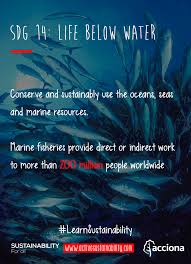Sustainable Development Goal 14: Life Below Water
Sustainable Development Goal 14 (SDG 14) is one of the seventeen Sustainable Development Goals established by the United Nations in 2015. SDG 14 focuses on conserving and sustainably using the oceans, seas, and marine resources for sustainable development. This goal is crucial for ensuring the health and well-being of our planet and its inhabitants.
Key Objectives of SDG 14
SDG 14 aims to:
- Conserve and sustainably use marine resources for sustainable development.
- Protect and restore ocean ecosystems.
- Minimize ocean pollution.
- Address the impacts of ocean acidification.
The Importance of SDG 14
Oceans cover more than two-thirds of the Earth’s surface and play a vital role in regulating the climate, absorbing carbon dioxide, and providing a source of food and livelihood for millions of people around the world. However, human activities such as overfishing, pollution, and climate change are putting immense pressure on marine ecosystems.
By implementing SDG 14, we can protect marine biodiversity, promote sustainable fisheries, reduce pollution, and mitigate the effects of climate change on our oceans. Achieving this goal is essential for ensuring a healthy planet for current and future generations.
How You Can Contribute to SDG 14
Individuals, communities, businesses, governments, and organizations all have a role to play in achieving SDG 14. Here are some ways you can contribute:
- Support local initiatives that promote marine conservation.
- Reduce your use of single-use plastics to prevent ocean pollution.
- Educate others about the importance of preserving our oceans.
- Participate in beach clean-up activities in your area.
- Advocate for policies that protect marine ecosystems and promote sustainable fishing practices.
- Choose seafood products that are sustainably sourced.
- Get involved in community efforts to address coastal erosion and protect marine habitats.
“The health of our oceans is intricately linked to the health of our planet. Let us all work together to ensure a sustainable future for life below water.”
7 Essential Tips for Protecting Our Oceans and Marine Life
- Reduce pollution to protect marine life
- Support sustainable fishing practices
- Minimize plastic waste to prevent ocean pollution
- Conserve coastal and marine habitats
- Promote responsible tourism near oceans
- Enhance ocean acidification monitoring efforts
- Collaborate with local communities for marine conservation
Reduce pollution to protect marine life
Reducing pollution is a crucial step in protecting marine life and achieving Sustainable Development Goal 14. Pollution from plastic waste, chemicals, and other contaminants poses a significant threat to the health of our oceans and the creatures that call them home. By minimizing pollution through proper waste management, recycling, and using eco-friendly products, we can help safeguard marine ecosystems and ensure a healthier environment for marine species to thrive. It is essential for individuals, communities, and industries to take responsibility and actively work towards reducing pollution to preserve the biodiversity of our oceans for future generations.
Support sustainable fishing practices
Supporting sustainable fishing practices is essential for the conservation of marine ecosystems and the long-term viability of fish populations. By choosing seafood products that are sustainably sourced, consumers can help reduce overfishing, protect endangered species, and promote responsible fishing methods that minimize harm to the environment. Additionally, advocating for policies that regulate fishing activities and promote sustainable practices can play a significant role in ensuring the health and sustainability of our oceans for future generations.
Minimize plastic waste to prevent ocean pollution
Minimizing plastic waste is a crucial step in preventing ocean pollution and safeguarding marine ecosystems, as outlined in Sustainable Development Goal 14. Plastic waste poses a significant threat to marine life, with millions of tons of plastic entering the oceans each year. By reducing our use of single-use plastics, properly disposing of plastic waste, and supporting initiatives that promote recycling and waste management, we can help protect our oceans and ensure a healthier environment for future generations.
Conserve coastal and marine habitats
Conserving coastal and marine habitats is a crucial aspect of achieving Sustainable Development Goal 14. These habitats are not only home to a diverse range of marine species but also provide essential ecosystem services that support human well-being. By preserving these habitats, we can protect biodiversity, maintain healthy fisheries, and mitigate the impacts of climate change. Implementing measures such as establishing marine protected areas, regulating coastal development, and promoting sustainable tourism practices can help safeguard these vital ecosystems for future generations.
Promote responsible tourism near oceans
Promoting responsible tourism near oceans is a crucial step in supporting Sustainable Development Goal 14. By encouraging sustainable practices among tourists and tourism operators, we can help protect marine ecosystems, reduce pollution, and preserve coastal habitats. Responsible tourism involves respecting marine life, minimizing waste, supporting local conservation efforts, and choosing eco-friendly activities. By promoting responsible tourism near oceans, we can ensure that future generations can continue to enjoy the beauty and biodiversity of our marine environments.
Enhance ocean acidification monitoring efforts
Enhancing ocean acidification monitoring efforts is a crucial step in achieving Sustainable Development Goal 14. By closely monitoring changes in ocean acidity levels, scientists and policymakers can better understand the impacts of human activities on marine ecosystems. This data is essential for developing effective strategies to mitigate ocean acidification, protect marine life, and ensure the long-term health of our oceans. Investing in advanced monitoring technologies and expanding research initiatives will play a key role in safeguarding the delicate balance of life below water for future generations.
Collaborate with local communities for marine conservation
Collaborating with local communities for marine conservation is a crucial tip in achieving Sustainable Development Goal 14. By involving communities that rely on marine resources for their livelihoods, we can ensure that conservation efforts are sustainable and effective. Local knowledge and practices play a significant role in understanding and protecting marine ecosystems. Working together with communities helps build awareness, foster stewardship, and create a sense of ownership over conservation initiatives, leading to long-term positive impacts on life below water.

